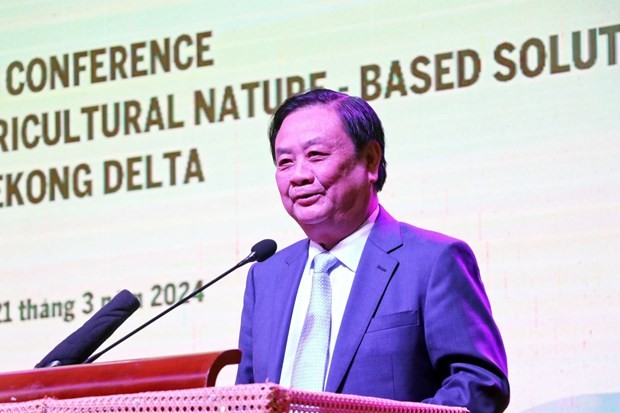
Minister calls on mobilising resources for nature-based agricultural development
Latest
 |
| Minister calls on mobilising resources for nature-based agricultural development |
Attending a conference on mobilising resources for nature-based agriculture held in Ca Mau province, the minister laid stress on the significance of nature-based solutions to improving farmers’ livelihoods and promoting the agricultural sector’s recovery, adding the approach helps mitigate and respond to climate change through the process of carbon absorption of land, wetland and forest, preserve nature and biodiversity, and maintain the future for food system.
Against this backdrop, agricultural producers should stand ready to shift to production measures that can restore nature while developing an effective and sustainable food system, he said.
Director of WWF-Vietnam Van Ngoc Thinh said that the WWF and its partners have implemented several nature-based solutions in the Mekong Delta region such as rice-fish, rice-shrimp, rice-lotus and shrimp-mangrove forest farming, which have shown economic efficiency while contributing to preserving biodiversity.
The WWF is willing to share the models with a view to developing agriculture sustainably and ensuring people’s health, he added.
At the event, international partners like the EU, the US, Australia, FAO, UNDP, WWF, international financial funds, and domestic and foreign enterprises committed resources to roll out nature-based measures in the region.
They recommended economic, technical and financial solutions, and related mechanisms and policies to promote nature-based agriculture in Vietnam and bolster international cooperation in the field.
The Mekong Delta contributes more than 90% of the country’s rice exports, and plays an important role in ensuring the global food security as Vietnam is now the world’s third largest rice exporter. The region is also rich in biodiversity with an array of ecosystems, from oceans, rivers and streams to mangrove forest islets and wetlands.
However, it is facing various challenges, including drought, saline intrusion and climate change which have affected local production and livelihoods. The region could be submerged by the end of the century if urgent actions are not taken across the river basin.
Scientists also said that 90% of the region’s land will be flooded if sustainable measures are not put into place.





















